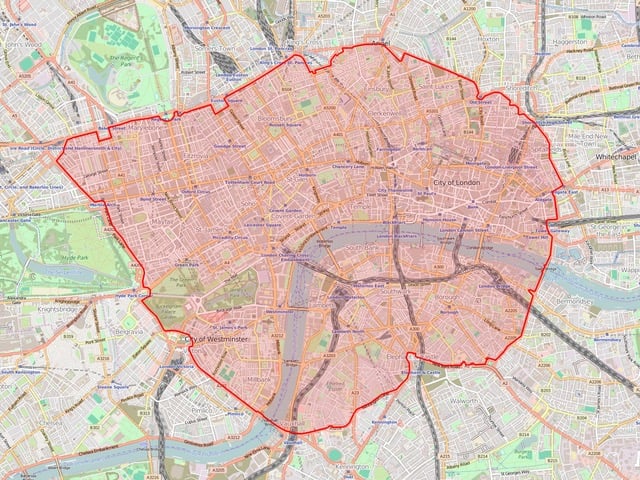Motorists driving into central London could soon be forking out £18 a day after Sadiq Khan unveiled plans to hike the congestion charge by 20% – the first increase in six years.
The proposed rise from £15 to £18 would come into force in January 2026, with Transport for London warning the charge could then increase annually after that, piling further pressure on drivers already struggling with the cost of living.
For owners of older, more polluting vehicles who also pay the £12.50 Ultra Low Emission Zone (ULEZ) charge, the combined daily cost would hit a painful £30.50 – more than many workers earn in an hour.
The Mayor’s office defended the increase, claiming that keeping the charge at £15 would result in an extra 2,200 vehicles clogging up central London every weekday by next year. But critics immediately slammed it as another attack on hard-pressed motorists.
This is just another money grab from Khan dressed up as environmental policy,” said Howard Cox, founder of FairFuelUK. “£30.50 a day for some drivers is absolutely scandalous. That’s over £150 a week for people who have no choice but to drive for work.”
The consultation, which opened yesterday, points out that the 20% rise is actually below inflation for the six-year period since the last increase in 2020. But that’s unlikely to provide much comfort to drivers facing the highest motoring costs in Europe.
Taxi driver Steve Williams, 58, who regularly ferries passengers through the congestion zone, said: “My customers are already complaining about the cost of getting around London. Another increase will kill business even more. Khan seems determined to make London a city only for the rich.
The congestion charge currently operates from 7am to 6pm on weekdays and noon to 6pm on weekends and bank holidays, covering a small area of central London including the City and West End.
Transport for London claims the charge has been successful in reducing traffic and improving air quality since its introduction in 2003. But business groups warn the latest increase could damage London’s economic recovery.
Many of our members are already struggling with reduced footfall and the shift to working from home,” said Helen Dickinson, chief executive of the British Retail Consortium. Adding extra costs for people coming into central London risks making the situation worse.
The timing is particularly sensitive given the recent expansion of ULEZ to cover all London boroughs, which sparked fierce protests and became a major political issue. Some outer London residents are still furious about having to pay £12.50 to drive their older cars in their own neighbourhoods.
Sarah Morrison, a florist who delivers to hotels in central London, calculated the increase would cost her business an extra £780 a year. “I can’t pass all of this on to customers – they’ll just use someone else. But I can’t absorb it either. It feels like Khan wants to drive small businesses out of London.”
The Mayor’s office insisted the increase was necessary to maintain the effectiveness of the scheme. A spokesperson said: “The congestion charge has been vital in reducing traffic and toxic air pollution in central London. This modest increase, the first in six years, will ensure it continues to work effectively.”
But Conservative London Assembly member Keith Prince accused Khan of “picking the pockets of hard-working Londoners yet again.
“First he expanded ULEZ against massive opposition, now he wants to squeeze even more money out of drivers,” Prince said. “When will this Mayor understand that not everyone can cycle or take the tube?”
The consultation documents suggest TfL is also considering changes to exemptions and discounts, though details remain unclear. Currently, residents living within the zone get a 90% discount, while blue badge holders and certain cleaner vehicles are exempt entirely.
Black cab driver Tommy Chen, who’s been working London’s streets for 15 years, warned the increase would inevitably be passed on to passengers. “What choice do we have? Everything’s going up – fuel, insurance, the cost of maintaining the cab. Now this. Tourists already think London’s expensive – this won’t help.
The proposed increase comes as TfL continues to face financial pressures following the pandemic’s impact on passenger numbers. Critics suggest the congestion charge hike is simply a way to plug budget gaps.
Let’s be honest about what this is – a tax increase by stealth,” said Michael Johnson, a policy analyst at the TaxPayers’ Alliance. “TfL’s finances are a mess and motorists are being asked to bail them out again.”
Environmental groups, however, welcomed the move. Anything that reduces traffic in central London is positive,” said Jenny Bates from Friends of the Earth. “But we need to ensure public transport alternatives are affordable and accessible for everyone.”
The consultation also revealed that TfL is considering future changes to how the charge operates, potentially including variable pricing based on how busy roads are – meaning costs could be even higher during peak times.
For many Londoners, the increase represents yet another financial burden in an already expensive city. Office worker Emma Thompson, who occasionally drives to work when running late, said: “Between parking, petrol and now potentially £18 just to enter the zone, it’s becoming impossible. But sometimes the trains are so unreliable, what choice do you have?”
Small business owner Raj Patel, who runs a computer repair shop just inside the congestion zone, feared the impact on his customers. “People already think twice about bringing their computers to me because of the charge. Add another £3 and they’ll just go somewhere in Zone 2 instead.”
The consultation runs until March, with any changes implemented from January 2026. But for many London drivers, the writing is already on the wall – driving in the capital is about to get even more expensive.
As one frustrated commuter put it: “First they came for our diesel cars with ULEZ, now they’re hiking the congestion charge. What’s next – charging us to walk on the pavements?”



